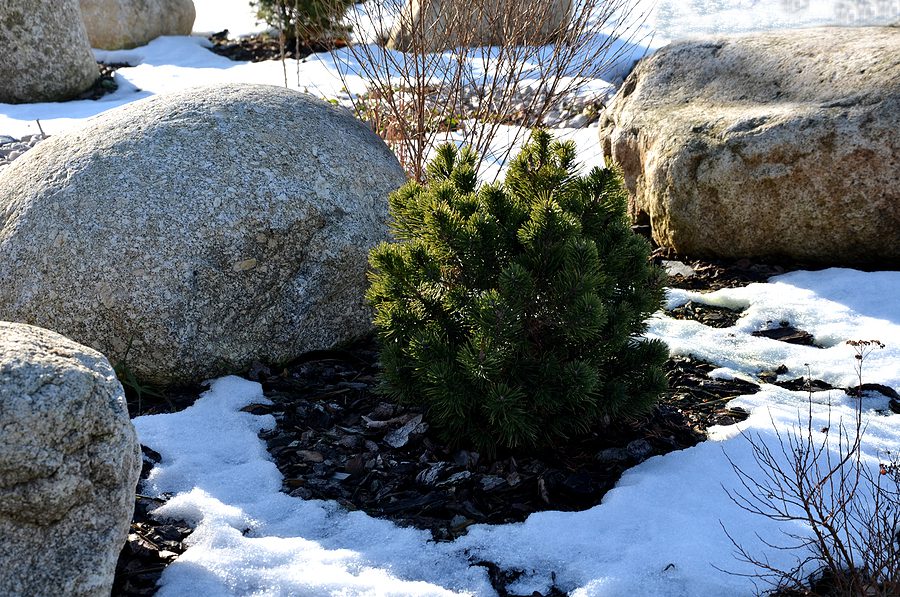Why Do I Need to Mulch My Garden in the Winter?

In the winter, your garden may seem like it is falling asleep, but it is an important time to take actions to ensure your plants are protected and safe even before the weather turns freezing.
The one activity you can do to accomplish this is winter mulching.
But why is mulching in the fall so essential – and how does it help your garden?
In this guide, we’ll explore how winter mulching forms a critical protective shell around your plants, the most effective way to do so, and which types of mulch work best with your plants and landscaping.
So Why Winter Mulch Your Garden?
Make a garden look good and healthier by using fresh mulch
Mulching has several critical uses during winter months to help make sure that your garden and landscaping stays healthy.
Benefits of Winter Mulching
Acts as a Soil Temperature Regulator: During short thaw intervals in winter, mulch shields the earth from warming rays of sunlight so that the soil stays frozen for extended periods. So this stability prevents plants from breaking dormancy too early.
- Keeps Early Growth in Check: In a perfect world, even an early warm spell can prompt premature blooming, causing frost damage or killing bloom buds, wilting root shoots, and impeding the vitality of the plant.
- Helps Keep Moisture In The Soil: The mulch helps preserve moisture, which will decrease how often you need to water during the winter months.
- Insulates Roots and Crowns: A layer of mulch prevents surface roots and crowns of plants from freezing.
- Protects From Soil Erosion: Mulching keeps soil in place in areas of a garden where soil erosion can be an issue – vegetable gardens, sloped landscapes.
When Should You Apply Mulch?
Timing is critical when mulching plants for winter. If you mulched too earlier you are wasting those valuable resources, not to mention the potential for injuring your plants.
General Guidelines for Mulching Right
After the First Frost
Wait until the ground has frozen, and tops of your plants have died back.
Mulching at the wrong time? It gets too hot and humid, and you grow fungus.
Avoid Frost Heaving
Frost heaving occurs when soil expands and contracts from freeze-thaw cycles, loosening plant roots. Mulch acts as a barrier to protect against this movement.
Protect Evergreen Trees and Shrubs
Apply 2 to 4 inches mulch around the base of evergreen plants. This enables each to hold on to moisture and shields from the nip of winter winds.
Insulate around plant crowns
Once the soil hardens up, pile a couple of inches of mulch around the crowns of perennials and grafted plants.
Vegetable Patch – Soil Erosion Prevention
Wrap crops in mulch later in the fall to hold soil in place. Or in some cases plant a winter cover crop for some added protection.
Protect Evergreen Trees and Shrubs
What type of mulch you use is critical to its effectiveness. Winter mulches must be relaxed, insulating and working materials.
Recommended Winter Mulches
Insulation: Snow is a bad insulator for cold-winter plants, but it still creates natural, insulating coverage from fierce cold.
- Shredded Leaves: A free and renewable way to dress the top of your garden beds, the shredded texture of leaves can shred and mat.
- Straw or Hay: This lightweight mulch is very effective straw works great in vegetable gardens but can be used in flower beds as well.
- Evergreen Pine Needles: They are very tough and moisture resistant, They also look very nice in your garden.
- Shredded Bark Mulch: Long-lasting and great for trees and shrubs, shredded mulch will help protect a garden against wind and temperature fluctuations.
- Christmas Tree Boughs: After the holidays, use your tree branches as mulch to help insulate your garden for the rest of the winter season.
How to Clean Up Mulch in the Spring
After winter has passed, then you need to pull back or redistribute your mulch. Here’s how to go about it:
- Frost Risk Check: Also, hold off until late spring to confirm that no surprise cold snaps will wipe out your plants.
- Lightly Rake Out Mulch: This prevents your plant crowns from rotting and allows for air circulation.
- Compost or Recycle: Whatever you use as the layers of organic mulch (leaves or straw) can go into your compost pile, or be spread on your garden beds.
Final Thoughts
Winter mulching is a very easy, but efficient way to booyah those crops and get your garden ready for a healthy and pretty growing season.
Mulch is an essential component of winter garden care because it insulates roots, conserves moisture and prevents soil erosion.
To discuss winter mulching or other plant care needs with the experts at R & S Landscaping, contact us today! Our team is ready to work with you this season to help your garden survive and thrive!
